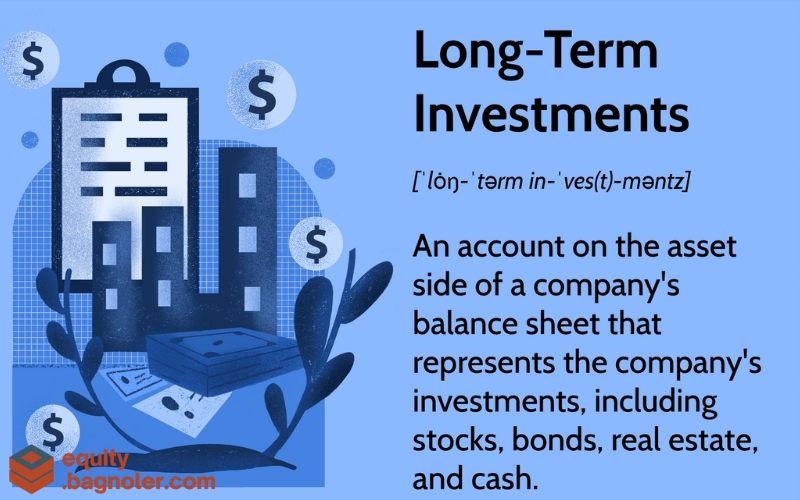Long-term investment in stocks, also known as equity, is one of the popular and effective investment methods to create sustainable asset growth. However, to be successful with this investment strategy, investors need to apply appropriate strategies, understand the market and factors affecting stock prices. This article will introduce some effective long-term investment strategies, helping investors optimize profits and minimize risks when investing in equity.
1. INVEST IN COMPANIES WITH SUSTAINABLE GROWTH POTENTIAL
One of the popular and effective long-term investment strategies is to invest in companies with sustainable growth potential. These companies often have solid factors such as: stable business model, talented management team, ability to adapt to market changes and future development potential.

Investors need to carefully study the company’s fundamentals such as revenue, profit, debt ratio, profitability, and growth strategy. Companies with clear competitive advantages, such as advanced technology, strong brands, or a monopoly position in the industry, will be ideal long-term investment options. These companies can help investors create stable asset growth over time.
2. INVEST IN STABLE DIVIDEND-PAYING COMPANIES
For investors looking for passive income from stocks, investing in companies that pay stable dividends is a wise choice. Dividends are the portion of profits that a company distributes to shareholders, and companies with a history of paying regular dividends often bring long-term benefits to investors. These companies often have a stable cash flow, sustainable business operations, and the ability to maintain attractive dividend levels over a long period of time.
Investing in stocks with stable dividends helps investors create a source of passive income, while minimizing risks compared to stocks that do not pay dividends or have irregular dividends. It is important for investors to choose companies that are able to maintain or increase their dividend levels over the years, thereby ensuring long-term profits.
3. INVEST IN GROWING INDUSTRIES
Another strategy for effective long-term investment is to choose industries that are growing strongly. The stock market tends to reflect the development of the economy, and emerging industries often have high profit potential.
Industries such as information technology, renewable energy, healthcare, and biotechnology are areas that are attracting the attention of investors. These industries often have the potential for outstanding long-term growth due to technological innovation, high consumer demand and favorable macroeconomic factors. However, investors need to pay attention to the potential risks in these industries, especially in newly developed industries that can have large fluctuations in stock value.
4. VALUE INVESTING STRATEGY
Value investing strategy, also known as value investing, is a very popular long-term investment method that has been proven effective over time. Investors following this strategy look for stocks that are undervalued by the market. These stocks may be undervalued due to temporary factors or because the market has not yet recognized their potential.
To implement this strategy, investors need to carefully analyze the company’s fundamentals, including profits, free cash flow, debt ratios, and other financial indicators. Companies whose stocks are undervalued by the market often have the ability to recover strongly in the long term, creating great profit opportunities for investors when the market recognizes the true value of the company.
5. INVEST IN INNOVATIVE COMPANIES
Companies that are able to innovate and develop new products and services are attractive options for long-term investment strategies. Creativity and technological innovation help companies maintain a competitive advantage and expand their markets. These companies can achieve outstanding growth in the future by developing unique products or services that meet consumer needs.
It is important to assess the ability to sustain innovation and change over the long term when investing in innovative companies. Companies in the technology, healthcare and consumer industries tend to be highly innovative and will create great investment opportunities for investors with a long-term strategy.
6. SUSTAINABLE INVESTING
Sustainable investing, also known as sustainable investing, is a trend that has become increasingly popular in recent years. Investing in companies that implement environmental protection, sustainable development and social responsibility policies not only brings financial benefits but also contributes to protecting the planet and communities.
Companies with sustainable development strategies and commitments to environmental protection often have a long-term competitive advantage, because they will better deal with environmental, social and governance (ESG) issues. These companies can attract the attention of institutional investors and individual investors looking for sustainable development in their investment portfolios.
7. AUTOMATIC INVESTMENT WITH “DOLLAR-COST AVERAGING” STRATEGY
Dollar-Cost Averaging (DCA) strategy is an effective long-term investment method in which investors will invest a fixed amount of money in stocks or investment funds periodically, regardless of how the stock price fluctuates. Implementing this strategy helps investors minimize the risk of short-term fluctuations and can buy stocks at an average price over a long period of time.
DCA is a great strategy for investors who do not want to monitor the market too much and can be patient to benefit from the long-term growth of stocks. By implementing DCA, investors are not too affected by market fluctuations but can still take advantage of the long-term growth of companies.
CONCLUSION
Long-term equity investment strategies can yield attractive returns if implemented carefully and with a clear strategy. To be successful, investors need to select potential companies, evaluate the factors affecting the stock value and always be patient with their investment plan. Regardless of the strategy chosen, effective research and risk management will be the decisive factors for success in long-term equity investment.
